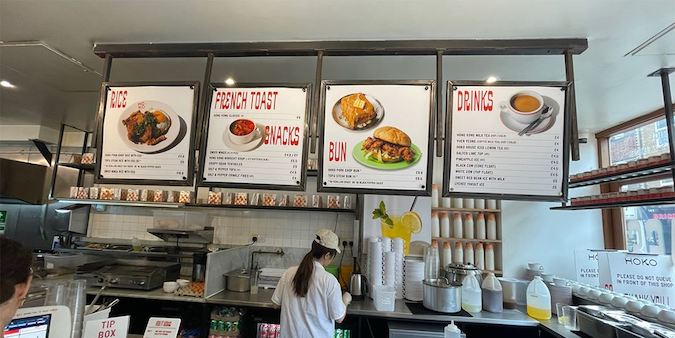There is something bittersweet about restaurants that cater to a country’s diaspora – nowhere more so than in London which, along with New York, is probably home to more foreign nationalities than any other city on Earth.
For some, it’s a chance to relive the taste of mama’s or grandma’s cooking (not as good, obviously) and enjoy the company of their own; for others, these places are a reminder of what they have lost – friends, family, home – from which they may have been separated by economic need or religious persecution.
Sometimes they double up as governments in exile, plotting a return to power after being driven out by fear of torture or death. Some diners may be ever wary of who might be lurking on the next table – examples being the Polish Café Daquise in South Kensington and the Czech (now the Czech & Slovak) Club in West Hampstead. When the iron curtain fell, they survived as places for all to enjoy sugary pastries and pork schnitzel.
One of the more recent additions to the London expat scene is Hoko, reviving memories of Hong Kong’s somewhat eccentric cafes serving a unique blend of Anglo-Chinese cuisine. It’s a style of food you won’t find in the capital’s many more conventional Chinese restaurants.

Hoko majors on the sweet side of things, it has to be said. Hong Kong French Toast comes topped with butter and a choice of golden syrup or condensed milk – or both if you insist.
Almost as sweet is Hong Kong milk tea, a strong brew which can be served cold in a plastic sachet to take home or hot to drink in.
It’s known back in Hong Kong as “silk-stocking” tea because the original 1950s recipe saw the tea filtered repeatedly through a sackcloth strainer. The story is that Hong Kong locals took a fancy to the colonial Brits’ afternoon tea habit but swapped out fresh milk and sugar for the more affordable evaporated and condensed milk.
The main courses tend to the pure comfort food end of the spectrum – chicken wings, pork chop or Char siu barbecued pork, all served with rice and a fried egg.
Set in the East End’s Brick Lane, itself the locus for generations of London’s immigrants, from Huguenots to pogrom-fleeing Jews and now Bengalis, Hoko is the brainchild of husband and wife team Nicole Ma (above) and Ryan Leung.
Hong Kong born and bred, Nicole and Ryan wanted to provide a home from home for the tens of thousands of Hong Kongers who came to Britain over the past few years under the British National Overseas passport scheme.
The programme has welcomed in a generation of people who found it increasingly impossible to do their jobs as the Beijing government took an ever-stronger political and economic grip on the former colony.
When I visited this summer I took my colleague Joe Lo, who came to the UK with his wife under the scheme and now works at Citywire as a videographer. Joe’s impressive showreel had included videos encouraging people to vote, made at a time when democracy was beginning to flower in Hong Kong before being stamped out ruthlessly.
“Made of memories” is the Hoko slogan, and Ma, a former florist, is on a mission to keep a taste of authentic Hong Kong in the minds of her many compatriots living in London.
Having started out creating online forums to help newcomers, it’s been a tough journey to the permanent place that the couple have now, starting with a milk tea delivery service before a Covid interruption led to a pop-up last year on the same premises.
As Ma admits, they were newbies in the business. “It was quite scary to put everything together without restaurant experience,” she said. “But as my previous boss used to say, ‘even if it’s scary, just jump; just do it’.”
Hoko has real Hong Kong authenticity with garish menu boards, bright lighting, communal benches and unprepossessing canteen-style tables. But the food, as my colleague Joe attested, is authentically good.

The clientele is a varied mix of Hong Kong expats, British-born Chinese (“the real BBC” according to Ma), local Asian residents and the thousands of tourists who steam through Brick Lane at the weekend.
It doubtless benefits from its location right opposite the Beigel Bake, a legendary 24/7 operation that is the jewel in the Brick Lane crown. When the Bake’s endless queues get too long, the temptation to try something new at Hoko is obvious.
But for Ma, it’s the people from back home who make what she is doing worthwhile. “We’ve seen quite a lot of Hong Kong parties and families,” she says. “I always feel very touched when I see a Hong Kong grandmother and old ladies having French toast. I hope we’ve become a little meeting point.”
While she and her husband try to smooth out the inevitable wrinkles that come with a new operation, Ma has her eyes on developing the Hoko concept. “We hope that it can be a starting point of a Hong Kong food concept and a food brand,” she says.
Given the reported level of surveillance of dissidents in the UK by Chinese Communist Party spies, I ask Ma if she’s noticed any suspicious activity at Hoko as it becomes a focal point for Hong Kong leavers.
“Not that I know of,” she says. “But then I probably wouldn’t, would I?”
This review was originally publish in the Real Life section of Citywire. X/Twitter: Richard Lander and On London. Main photo from Hoko’s website. If you value On London’s coverage of the UK capital, become a supporter or a paid subscriber to publisher and editor Dave Hill’s personal Substack for just £5 a month or £50 a year. Thank you.

